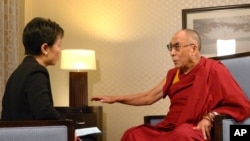Tibet's exiled spiritual leader, the Dalai Lama, has been in Washington since last week, celebrating his birthday and guiding followers of Tibetan Buddhism in a multi-day prayer and meditation ritual. He sat down with VOA to discuss his first visit to the nation's capital since stepping down as the exiled Tibetan government's political leader.
The Dalai Lama says he feels "freer" since relinquishing his role as the exiled Tibetan government's political leader. Now, he says he can devote his energy to helping others live happier lives and to promoting religious harmony.
|
The Dalai Lama speaks with VOA's Xin Chen about his homeland and its future in relation to China. |
The Tibetan spiritual leader spoke to VOA Tuesday in Washingon. He said it is up to the newly elected leadership of the exiled Tibetan government to pursue negotiations with China. But he added, he is willing to help if asked. "Now I am no longer sort of responsibilty. In case the elected leadership need some of my help, then I always available," he said.
The Dalai Lama's visit to Washington is his first since he stepped down from his political role in March. Last year, a meeting between the Dalai Lama and President Barack Obama at the White House angered China, even though the administration went to great lengths to keep it low-key by releasing a single still photo of the two together and a written statement.
With only a few days left in the Dalai Lama's visit, there has not been any public announcement from the White House that the president plans to meet with him.
The Dalai Lama told VOA that if he has an opportunity, he would meet with President Obama. But he said his main reason for being in the United States is for Buddhist teaching. "I know the president very well, so if there's opportunity meeting, I am very happy," he said.
Last week, the Dalai Lama met with several U.S. lawmakers in Washington to explain why he stepped down from political leadership. He shared his beliefs with VOA. "The world belongs to humanity, and each country belongs to the people - not one particular party or king or spiritual leaders," he said.
He said that was why he ended the four-century-old tradition of the Dalai Lama being in charge of both Tibet's spiritual and political affairs. He called the tradition "out-of-date."
The Tibetan spiritual leader also reflected on his six decades of dealing with officials in Beijing. He said that while he still supports Marxist ideas, he believes democracy is the only answer for the world.
He said he believes China needs reform, including more transparency and freedoms, and that he believes there is a growing voice for it there.
The 76-year-old Tibetan leader fled into exile after a failed uprising of his Tibetan people against the Chinese government in 1959. Beijing has accused the Dalai Lama of advocating Tibet's succession from China. But the Dalai Lama insists he just wants political autonomy for Tibet, not independence.
He told VOA that he believes it is only a question of time until both sides find a solution to the issue of Tibet through dialogue. He said ignoring the issue or forcing a deal would be, in his words, "short-sighted."
Watch VOA's interview with the Dalai Lama
Part 1
Part 2




